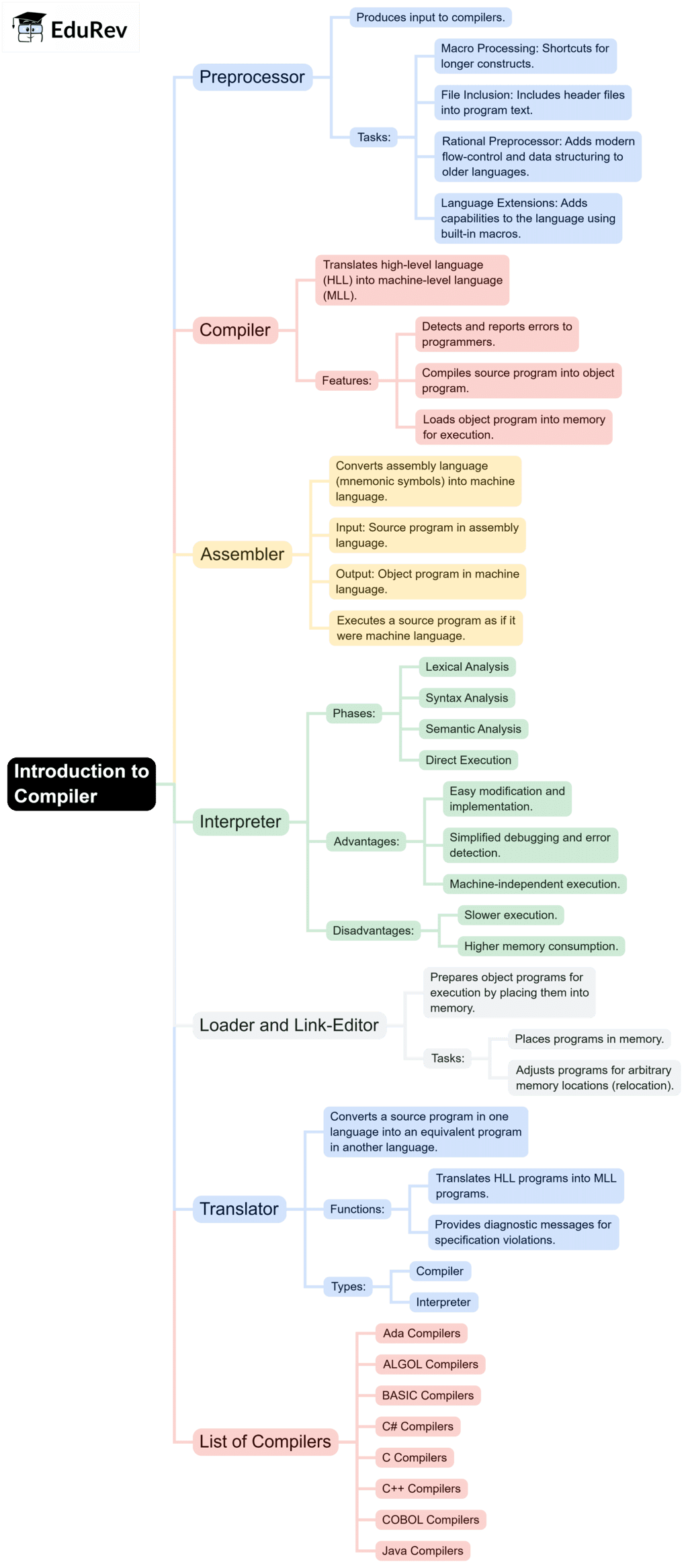Computer Science Engineering (CSE) Exam > Computer Science Engineering (CSE) Notes > Compiler Design > Mind Map: Introduction to Compiler
Mind Map: Introduction to Compiler | Compiler Design - Computer Science Engineering (CSE) PDF Download

The document Mind Map: Introduction to Compiler | Compiler Design - Computer Science Engineering (CSE) is a part of the Computer Science Engineering (CSE) Course Compiler Design.
All you need of Computer Science Engineering (CSE) at this link: Computer Science Engineering (CSE)
|
26 videos|90 docs|30 tests
|
FAQs on Mind Map: Introduction to Compiler - Compiler Design - Computer Science Engineering (CSE)
| 1. What is a compiler and how does it work? |  |
Ans. A compiler is a specialized software that translates high-level programming code written in a programming language (like C, C++, or Java) into machine code or intermediate code that a computer's processor can understand. The compilation process typically involves several stages: lexical analysis (breaking the code into tokens), syntax analysis (checking the code structure), semantic analysis (ensuring meaning is correct), optimization (improving code efficiency), and code generation (producing executable code).
| 2. What are the main phases of a compiler? |  |
Ans. The main phases of a compiler include:
1. Lexical Analysis - Converts the source code into tokens.
2. Syntax Analysis - Checks the tokens against the grammatical rules of the programming language.
3. Semantic Analysis - Ensures that the operations in the code make sense.
4. Intermediate Code Generation - Produces an intermediate representation of the code.
5. Code Optimization - Refines the intermediate code for performance improvements.
6. Code Generation - Translates the optimized code into machine code.
7. Code Optimization - Improves the generated code for better performance.
| 3. What is the difference between a compiler and an interpreter? |  |
Ans. The primary difference between a compiler and an interpreter is how they execute code. A compiler translates the entire source code into machine code before execution, creating an executable file that runs independently. An interpreter, on the other hand, translates code line-by-line or statement-by-statement at runtime, which means it does not produce a separate executable file. This can make interpreters slower than compiled programs, but they offer more flexibility during development.
| 4. What are syntax and semantic errors in programming? |  |
Ans. Syntax errors are mistakes in the code that violate the grammatical rules of the programming language, preventing the compiler from processing the code. Examples include missing semicolons or incorrect use of brackets. Semantic errors occur when the syntax is correct, but the code does not produce the intended result due to logical mistakes, such as using the wrong variable or performing an operation that does not make sense.
| 5. Why is optimization important in a compiler? |  |
Ans. Optimization is important in a compiler because it enhances the performance and efficiency of the generated code. By optimizing the code, the compiler can reduce execution time, decrease memory usage, and improve overall resource management. This is particularly crucial for applications that require high performance or run on constrained devices, as optimized code can lead to significant improvements in speed and efficiency.
Related Searches





















